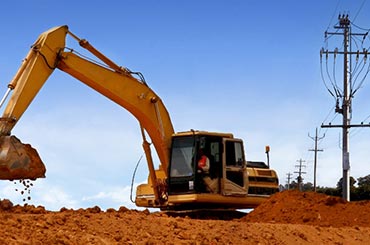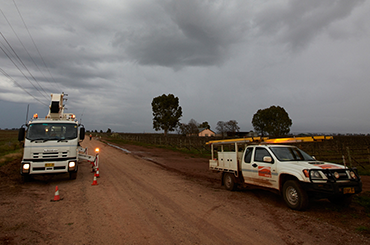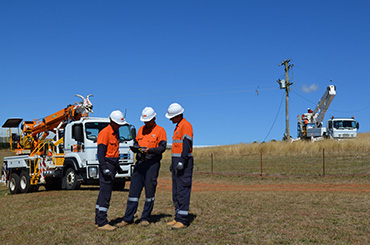
For large commercial customers, cost savings are achievable through various energy-efficient strategies.
- Upgrade lighting to efficient LEDs with occupancy sensors.
- Use building automation for HVAC control.
- Maintain and upgrade HVAC systems regularly.
- Improve insulation and install efficient windows.
- Optimize temperature with programmable thermostats.
- Explore on-site renewables like solar panels.
- Manage loads to reduce peak energy use.
- Promote employee energy-saving awareness and practices.
Power factor correction
Power factor correction is about using electricity efficiently. It's like managing traffic on a highway. Your electrical system is the highway, and power factor is how well electricity flows when using different types of electrical devices.
A good power factor means smooth electricity flow and better value. A poor power factor is like traffic jams, wasting electricity and your money.
Power factor correction is like traffic management to clear jams, saving energy and money. It's like keeping electricity flowing smoothly on the highway, getting the most out of what you pay for.
Shifting load
Shifting your load, in simple terms, is like rearranging your daily tasks to save money on electricity. It's a bit like scheduling your activities at different times to take advantage of lower prices. You have some practical options to save money on electricity. You can do this by manually adjusting when you use electricity, like using timers, or by moving certain equipment to tariffs you can control (switch on and off). These simple strategies can help you reduce your energy costs.
Conservation Voltage Reduction (CVR)
Conservation Voltage Reduction (CVR) is an energy-saving technique that's like adjusting water flow from a tap for optimal use.
In your home, electricity is akin to` water pressure. Sometimes, it's unnecessarily high, leading to energy wastage. CVR subtly reduces this "pressure" while maintaining smooth operation.
Think of a light bulb. If it's getting more electricity than it needs, CVR slightly dims it, saving energy without you noticing.
CVR ensures your devices work efficiently, providing the same performance with less electricity. This benefits your finances and the environment.
Voltage Optimisation
Voltage Optimization fine-tunes your electrical supply, aligning it precisely with your needs. Just as you adjust music volume, it ensures your home's electricity stays in the ideal range.
Appliances, like songs, perform best with a specific level of electricity, optimizing efficiency, saving energy, and extending device life. It's a win-win for your bills and the environment, akin to enjoying your music just the way you like it.
Installation of Solar PV
Solar Accreditation Australia has information on the installation of solar equipment and a list of ‘preferred’ installers.
When considering solar energy, consulting with an expert can help you maximize its benefits. While solar panels may not always reduce demand tariffs, a consultant can provide tailored solutions like
Power Factor Correction, Demand Management, or Energy Management Systems for optimal savings. It's important to note that while solar has immense benefits, it can also impact power factor, but with the right guidance, you can navigate these limitations effectively. Demand management is like being a savvy shopper for electricity. It's all about using your power-hungry appliances, like air conditioners and heaters, at the right times to save money on your energy bills.
Energy Management System
An Energy Management System (EMS) is like having a smart assistant for your home or business that helps you keep your energy use in check.
Imagine you have lots of appliances and devices using electricity—lights, heaters, air conditioners, and more. An EMS keeps an eye on all of them. It learns when and how you use energy, and then it helps you use it more efficiently.
Energy efficient lighting
Energy-efficient lighting, like LED bulbs with occupancy sensors, offers customers several advantages. It lowers electricity costs, lasts longer, and emits fewer greenhouse gases for a greener environment. It also provides consistent, high-quality lighting, comes in various designs, and is a practical, cost-effective choice for customers.
Variable speed drives and pumps
Variable speed drives and pumps offer customers precise control, reducing energy consumption, operating costs, and noise levels while extending equipment lifespan. They're like smart helpers for water systems, adjusting flow for efficiency and smooth operation. These systems are cost-effective and environmentally responsible choices for fluid handling needs.
Battery storage
Batteries can be used to store energy generated from solar systems, or from the grid, and provide a way for you to efficiently manage your energy use. More information is available at the Energy NSW website.
It benefits customers by storing excess energy, using it when grid electricity is expensive or demand is high, and cutting electricity bills. It may provide backup power during outages for reliability.
However, for customers without sufficient space or financial flexibility, or those constrained by capital or the lease arrangement of their building, accessing these benefits might be challenging.
Negotiate a better deal with a Retailer
When considering a new energy retailer, customers should first compare pricing plans to find the one that best aligns with their energy consumption and budget. It's important to check for any hidden fees or charges and understand the contract terms, such as contract length and exit fees.
Additionally, customers should research the company's reputation and customer service record, seeking reviews and recommendations.
Exploring their sustainability initiatives and renewable energy options can also be a vital consideration for environmentally conscious customers. Lastly, evaluating the ease of account management, billing options, and available customer support can make the energy retailer transition smoother and more satisfying.



